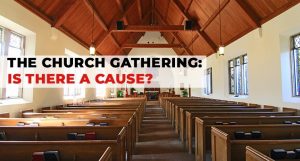2020 was a year that many focused upon their church’s vision. Almost every church on the planet went with the theme of Vision 20/20, which I believe was both natural and organic. Church leaders had tremendous high hopes of leading their congregations to a year of high performance and expectation. This numbered year only comes around once in life, and many pastors placed a greater level of expectation on the moving of the Holy Spirit and the power of God to recreate an already misfocused and biblically illiterate church culture. Many leaders had high hopes and expectations of using the year 2020 to refocus on bringing vitality and vigor to their fledgling visions.
I was among these church leaders that saw a tremendous opportunity to take advantage of this “once-in-a-lifetime” chance to organically move people towards living a focused life for the Kingdom. This seemed to me, and many others, like a God-opportunity to lead the church back to the Bible basics of evangelism and discipleship. Not only was the year 2020 a gift for church leaders, it was also the beginning of a decade – I referred to it as the “decade of champions.” The year 2020 was full of hope, optimism, expectation, and opportunity, and many of us were ready to ride it to the wheels fell off.
The first month of the year 2020 was going well, then we experienced the tragic death of Kobe Bryant, which shook the world. Kobe Bryant was a multimillion-dollar millennial who seemingly had nothing left to do in life but figure out how he would use his wealth to create newer platforms to enjoy his hobbies and spend time with his daughters and wife. The very violent helicopter accident, in which he and his young daughter with several others plunged to a horrific death, caused the world to mourn. Kobe’s death impacted multiple continents and class groups including church leaders. This event was the focus of every major news channel and the whole world was having conversations of utter amazement. How could someone so young, so rich, and with so much potential to live an amazing life after basketball die like this, and to top it off, on a Sunday morning, the day of worship. I remember when I heard the news right after church had ended. I was in utter disbelief – not Kobe. While many professional athletes, coaches, and the entertainment industry were trying to wrap their minds around a realty that was disruptive for them, families, cultures, generations were emotionally stung. This made us look at life differently; his death demonstrated that money, talent, potential, and fame cannot defeat the reality of death and mortality. My wife and I happened to have a trip scheduled in L.A. during this time and I was utterly amazed at the memorial that was set up for him at the Staple Center where tens of thousands of people of every ethnicity gathered daily to pay their respect and tribute to this fallen star.
It was right on the heel of this mortality disruption, where we had just experienced some of our toughest athletes and coaches breaking down emotionally on national television over the death of the beloved Kobe Bryant, that something more disruptive had already begun in Wuhan, China – the novel coronavirus. In the first month of 2020, in what seemed like a year of opportunity and celebrated as such, all over the world, disruption began – the rise of the coronavirus, known as COVID-19, a very deadly virus that attacks the respiratory system. 2020 literally began with a breath-taking virus that was now spreading across the globe, taking thousands and thousands of lives from every race, gender, class, and country. COVID-19 is responsible for hundreds of thousands of lives and is still ravaging families globally. America seems to be experiencing it the worst based upon researchers. The elderly and the African American community tend to be at the highest mortality risk category due to underlying health issues, chronic diseases, and decreased access to health care due to poverty and discriminatory practices. At any rate, the disease is still spreading, testing is inadequate, medical supplies are low, the health care system is overwhelmed, and the health care professionals are extremely vulnerable.
There is no proven vaccine, and the normal expected process time of vaccines to run clinical testing is 12-18 months. The only alternative to slow this dreadful virus down is the practice of social distancing. The Centers for Disease Control (CDC) provided social distancing and hygiene guidelines for everyone to follow. Social distancing is a set of actions taken to stop or slow the spread of a highly contagious disease. The goal of social distancing is to limit face-to-face contact to decrease the spread of illness among people in community settings. The expected benefits of social distancing, aside from slowing and reducing the spread of illnesses, is to allow the health care system to be able to handle the load of patients. There must be adequate respirators, beds, personal protective equipment (PPE), etc. to effectively handle the highly contagious virus. Social distancing has changed our world literally. In 2020, for the first time in my lifetime, all sports events have been discontinued for the season. The public education system shut down all the elementary and primary schools and children have had to learn online. Colleges and universities also sent their students home and transitioned to online classes. All graduations have been cancelled due to social distancing. And all places of entertainment were ordered to close their businesses – bowling alleys, movies, theaters, theme parks, arcades, and malls were ordered to close their doors.
The effect on people is only one side of a two-sided coin. The global economy and national economies are also under great strain. Businesses were categorized as essential and non-essential in order to keep barebones economic functions going. Essential businesses include pharmacies, grocery stores, restaurants, electronic stores, and oh yeah, liquor stores, and others. While the essential businesses were allowed to provide goods and services to the public, they had to modify how they serve people; for example, restaurants could only provide to-go orders. Retail stores that were considered essential had to ensure that clientele remained six feet apart and/or limited in how many people could be served at a time in order to keep in compliance with CDC guidelines. The non-essential businesses were asked to work from home, running their business virtually, so that essentially their doors were closed.
The church was classified as a non-essential in Texas and offered the option of doing online services. The church being ordered to shut its doors was unprecedented and met with resistance; however, the vast majority complied. While everyone knows that Easter is the most celebrated holy day of the Christian calendar, the Christian church was forced to celebrate Easter online from the Vatican and the Roman Catholic Church to the Protestant churches. This was a major societal disrupter; at a time when the pandemic was still spreading and threatening the life of millions, people could not go to the one place that they historically could find comfort, the house of God. From a political point of view, this was a major, especially when you consider the separation of church and state. Church leaders had to forgo their constitutional rights for the physical life and safety of its congregants. It was no longer about a right to worship; it was about is it right to worship in this manner due to the high risk of the spread of the disease.
Unfortunately, while the church world took to cyberspace, not all churches were cyber savvy and did not have the technological capacity to go live. These churches, due to their technological ignorance, are facing possible extinction due to this disruption. They have lost contact with their congregations due to their unpreparedness for this technological nightmare. COVID-19 has disrupted the world and the church is not excluded. Well as you can tell, the year of vision 20/20 has disrupted the way we are accustomed to doing things.
What is disruption? A disruption is a major disturbance, something that changes your plans or interrupts some event or process. A screaming child on an airplane can be a disruption of the passengers’ sleep. A break in the action, especially an unplanned and confusing one, is a disruption. 2020 has definitely disrupted our way of life; when major disturbances occur, like COVID-19, it forever changes us. I personally believe that this is an act of God; this pestilence has fallen on us due to global apostasy and crimes against humanity. We have placed money, pleasure, and opportunity before God, which has led to unprecedented immoral behavior. God is disrupting our world; however, I don’t believe that this is the end of the world. Since this is not the end of the world, we must understand how to handle disruption. While this is a time of repentance for the church, it is also an opportunity to reach the world in ways we have not been able to reach her with a greater level of efficiency.
This disruption is allowing the church to communicate its message to a world that is more prone to hear due to the COVID-19 pandemic. For the first time in decades, maybe a century, people are not simply thinking about life at this moment, they are thinking about death. Every time you see someone practicing social distancing, this is a sign that they are thinking about the reality or potential reality of death. In this season, people are not, en masse, thinking about what they are going to do and where they are going to vacation. People are thinking about not contracting the virus and staying alive. This COVID-19, with all the heartbreak and damage it has caused, has also leveled the playing field for church ministries and the message of the church. COVID-19 and its devastating effects will eventually pass but the residual effects will remain with us for some time – to remind us of our mortality, which in terms should speak to our morality. The year 2020 is disruptive – Kobe Bryant, the U.S. presidential impeachment, and COVID-19 are all major events that signal that God is not trying to get our attention, He has it. But the great question is, “Are we listening?” The Bible states “Let he that has an ear hear what the Spirit is saying to the churches.”
So what happens to all of the hope, expectation and excitement for the year 2020, and the decade to come? Disruption, while it shakes up things, it also provides opportunity. So I believe that the church has its greatest opportunity during this disruption. Vision 20/20 is not the end of vibrant ministry; it is the beginning of a new normal that is latent with tremendously, overwhelming opportunity. Disruption in the business world has always been seen as an advantage to the little guy, and in a world that is not focused on God, from a market share position, the church is considered the little guy.
When it comes to business opportunity, disruption is always in favor of the little guy. Let’s consider what was written in the Harvard Business Review:
“Disruption describes a process whereby a smaller company with fewer resources is able to successfully challenge established incumbent businesses. Specifically, as incumbents focus on improving their products and services for their most demanding (and usually most profitable) customers, they exceed the needs of some segments and ignore the needs of others. Entrants that prove disruptive begin by successfully targeting those overlooked segments, gaining a foothold by delivering more-suitable functionality—frequently at a lower price. Incumbents, chasing higher profitability in more-demanding segments, tend not to respond vigorously. Entrants then move upmarket, delivering the performance that incumbents’ mainstream customers require, while preserving the advantages that drove their early success. When mainstream customers start adopting the entrants’ offerings in volume, disruption has occurred.”
This is an excellent summation that helps the church understand that disruption from a market share position can be filled with great opportunity. This disruption has allowed the church to offer not only its message but its ministry to an online community that has been largely ignored by the church. 2020 has become of the year of new vision in terms of the church’s usage of technology. After the re-opening of the economy, church will never turn back to usual. Hence, Vision 20/20 has to be a vision of disruption.
I believe God is telling the church to recalibrate and reset your vision for the 21st century. We must upgrade our vision technology to not simply say we’re going to the world but actually reach the world. This disruption has given the church equal access to the world to preach, teach, and demonstrate the gospel. While we corporately gather, we must missionally expand. While we stay together, we also must go together to all the world and make disciples. We can now rethink missions and the Great Commission in light of the past historical failures of missions and colonization. We can get the message around the world in its Jewish context, void of the watersheds of Romanization, Europeanization, Colonization, Westernization, and Americanization of the gospel (Carson, Five Watersheds of History and Theology, 2019). We have the opportunity to provide Bible teaching and leadership training to leaders in their indigenous culture and can utilize travel funds for teaching and establishing Kingdom-minded churches. We can reach church markets that consist of the “Done’s” – those who were finished with the church due to the lack of Bible focus and teachings. We can reach remote and rural areas where they don’t have access to biblically sound, Kingdom-minded churches. Not only can we preach and teach them, we can have communion with them, we can pray with them, we can disciple them through small groups, and we can involve them in ministry through cyber ministry. The possibilities are limitless if we take advantage of this disruption. However, if we don’t integrate technology, we will disintegrate as a local church organization.
The disruption of the church has presented us with the opportunity to think, act, and go global now! When we don’t pay attention to disruption, what happened to Blockbuster and Hollywood Video will happen to the church. Redbox put them out of business and then Netflix is putting Redbox out of business; each iteration of innovation makes the last iteration obsolete. Like the maturation or innovation of albums (LPs and 45’s), 8-Track, cassette tapes, LaserDisc, CDs, DVDs, etc. The church is going through another disruption from getting the gospel out since the time of traveling by animal transportation, to boats, trains, motor vehicles, planes, and now the internet, etc. But 2020 disrupted the church and has given us the opportunity to rethink ministry and embrace this disruption as an opportunity to be more effective in spreading the gospel message of the Kingdom around the world as a witness.
Articles have been written stating that many churches are not able to sustain their churches due to the lack of revenue generation and disconnect. Unfortunately, many smaller churches have not had the need for cyber technology due to their disconnection from the millennial and xenial generation. It is my recommendation that the following suggestions be given serious attention and consideration in order to face a new normal after the 100% re-opening of the economy. The new normal demands that churches engage in the following:
- Churches need to embrace the cyber church market and learn to value the millions of people who can hear your message beyond the walls of your church.
- Churches must make themselves disconnection-proof by ensuring that they have the necessary technology packages that can allow them to stream their church services as cyberspace church attendance and visitation becomes the wave of the future or the new normal.
- Churches must also think about restructuring their volunteer ministry to include cyberspace-based service opportunities in order to reach a new generation of potential church attenders and members.
- Churches must engage in critical thought about how to reduce the need for in-person obligations and structure more video conferencing like Zoom to execute church meetings and the like.
- Churches need to rethink how they can engage in foreign missions through building relationships in foreign countries through cyberspace ministry.
- Churches must also rethink church communications utilizing social media platforms and content creation that allows the church to communicate with members, visitors, and potential members.
While these are but a few recommendations, I believe that this is a good starting point in terms of preparing for the disruptive church, the new normal. COVID-19 has given the church a unique opportunity to expand the Kingdom of God through cyberspace. Let us always remember the words of Jesus, “The harvest is plentiful, but the laborers are few”(Matthew 9:37).






